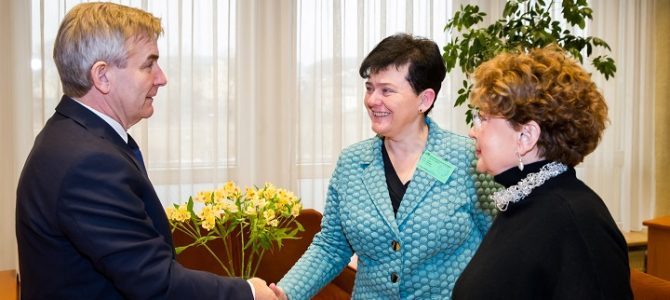
Diana Varnaitė. Photo courtesy Lithuanian Parliament
BNS–Director of Lithuania’s Cultural Heritage Department Diana Varnaitė is proposing separate financing for preservation of Jewish heritage. Lithuanian parliamentary speaker Viktoras Pranckietis approves the idea.
“We would think it would be appropriate to increase financing, and I told the speaker of parliament about our hope that it would be worthwhile for all of us together, with the leadership of the Ministry of Culture, to discuss … a separate line for Jewish heritage, not just for synagogues, because we have some [other] unique monuments, for example, the former religious school, the yeshiva building in Telšiai. These are sites in which we should take pride, as our own heritage, and which would make our [rural] regions more attractive and draws for tourists,” Varnaitė told BNS Wednesday after a meeting with the parliamentary chairman.
Parliamentary speaker press representative Dalia Vencevičienė said speaker Pranckietis expressed approval for the idea. “We have a policy direction on heritage and its preservation. The chairman would welcome the idea if the Ministry of Culture adopted a decision on a separate line in the budget,” she told BNS.
Varnaitė said that decision would facilitate cooperation between the executive branch and those engaged in heritage protection. “There would be an agreement on what specific and clear sum could be allocated annually for preservation work. Of course the appearance of a separate budget item really wouldn’t solve all problems. If this sort of heritage protection program for Jewish heritage did appear, it would be aimed more at rescue work for cultural heritage sites,” Varnaitė told BNS.
She said she hadn’t approached the new leadership at the Ministry of Culture for separate financing yet, and suggested a decision be made in the near future because tasks for next year are already being planned according to the budget received.
There is no exact registry of the number of synagogues still standing in Lithuania. Varnaitė said there are currently 10 former Jewish houses of prayer which are in serious disrepair and in danger of collapse, and a portion of these are being repaired now or plans are in the works to do so. She said reconstruction of buildings is important, but so is adapting buildings for public educational, social and cultural needs. She cited the Kėdainiai complex of synagogues as an example, where for over a decade now a museum, a multicultural center and a children’s art school have been operating. In a month, she said, they hope to reopen the second refurbished synagogue in Joniškis, the restored wooden synagogue in Alytus already adapted for cultural use and a Jewish religious building in Pakruojis, Lithuania, where a children’s reading room under the Pakruojis Library is scheduled to operate.
Varnaitė noted 4.1 million euros have been allocated this year for all heritage protection programs. Currently this funding is being used to repair the synagogues in Alytus and Žiežmariai, and the Choral and Zavl Synagogues in Vilnius, but also goes for completely different heritage sites including manor estates, and some of the funding is used to compensate owners of private sites.
“Sometimes that’s the amount needed for one site, but this is for all work to preserve heritage sites in general… It’s clear we need to look for ways to increase the amount, because it’s obvious to the naked eye this sum is very humble,” Varnaitė commented.
She said heritage protection specialists don’t see the necessity in restoring one site right away, rather it’s important to plan work for buildings on the verge of collapse and to schedule deadlines by which work has to be completed, allowing for successful protection even with limited funding.
Lithuanian Jewish Community chairwoman Faina Kukliansky participated in the meeting and said especially important was the desire of regional Jewish communities and municipalities to preserve former Jewish religious property, which is part and parcel of Lithuania’s heritage.
“There are no Jews left in southern Lithuania, there are no Jewish communities in Suvalkija or Dzūkija, so the preservation of our cultural riches, of our heritage, rests solely on the shoulders of the local administration. There are always obstacles, because there always appear new organizations, groups which want to get involved in heritage protection, but no one wants to invest even a single cent, nor to work… Heritage is work, requiring exertions every day, and no municipality wants to take over ruins, they want to acquire beautiful commercially adapted buildings. We always come up on the problem of how to get local residents involved,” she said when asked to name current problems.

